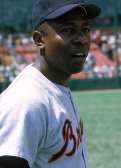'Legends never die': Braves remember Aaron's legacy
This story was excerpted from Mark Bowman's Braves Beat newsletter. To read the full newsletter, click here. And subscribe to get it regularly in your inbox.
ATLANTA -- Ask many of the current Braves about having the opportunity to celebrate the 50th anniversary of Hank Aaron’s historic 715th homer and you’ll quickly realize how appreciative they are to have had a chance to know the legendary slugger.
“It fills you with pride, especially being in the same organization,” Ronald Acuña Jr. said. “It just fills you with emotion to see how it all went down with his teammates, and players from the Dodgers congratulating him. It was just such a great moment.”
The Braves will celebrate the 50th anniversary of Aaron’s historic long ball prior to their game against the Mets on Monday. The parents of some of Atlanta's players weren’t even alive on April 8, 1974. But images of Aaron breaking Babe Ruth’s home run record were frequently seen throughout their childhood, and that of their children.
“It's one of the greatest sports moments in history, and I got to meet the guy,” Austin Riley said. “I get chill bumps just thinking about it. What he's meant to the game and outside the game, he's an icon. It’s like that line from 'The Sandlot': ‘Heroes get remembered, but legends never die.’”
Aaron’s legendary presence has been felt since he debuted for the Milwaukee Braves as a 20-year-old on April 13, 1954. He earned the first of 25 All-Star selections a year later and won the National League MVP Award while helping the Braves win the World Series three years later.
But nobody could have predicted what he was going to do 20 years after his debut. When the 1954 season started, the top five home run hitters in MLB history were Ruth (714), Jimmie Foxx (534), Mel Ott (511), Lou Gehrig (493) and Joe DiMaggio (361).
Reaching 400 homers was viewed as a great accomplishment. Passing 714 seemed unrealistic before Aaron ended his career with 755 home runs.
Riley is among the current Braves old enough to remember when Barry Bonds broke Aaron’s record on Aug. 7, 2007.
“You love to see those records being chased, but at the same time, part of me didn’t want [Bonds] to catch him just because of what [Aaron] meant to the game,” Riley said. “I feel like Hank deserved to stand up there on a pedestal by himself.”
Riley says his biggest regret was never getting his picture taken with Aaron, who passed away in January 2021, 10 months before the Braves won the World Series.
“Growing up here in Atlanta, you always heard about how much better of a person he was than he was a player,” Michael Harris II said. “I’ve had a chance to be in his presence a couple of times at different events. Now, I have a chance to follow in his footsteps and kind of take on the legacy he left behind.”
Manager Brian Snitker has forever been thankful for the opportunity Aaron provided in 1980, when he ended Snitker's days as a backup Minor League catcher and gave him his first coaching job within the Braves’ organization.
Snitker was playing college baseball on April 8, 1974, so he doesn’t have any vivid memories of where he was when the historic homer was hit. But he remembers being in awe of the legendary slugger when they crossed paths just a few years later.
“You’re sitting there stretching and he’s walking around as the farm director, and you’re just like, ‘Oh my God, that’s Hank Aaron,’" Snitker said. "It’s like one of those surreal, larger-than-life things. Guys like that have a presence.”
Snitker enjoyed countless conversations with Aaron over the decades that followed.
“We used to sit in the clubhouse at Spring Training listening to him tell stories and it was never about him,” Snitker said. “We all had questions. We were young coaches and young managers. He was very approachable and that’s why we all wanted to do well for him.”

